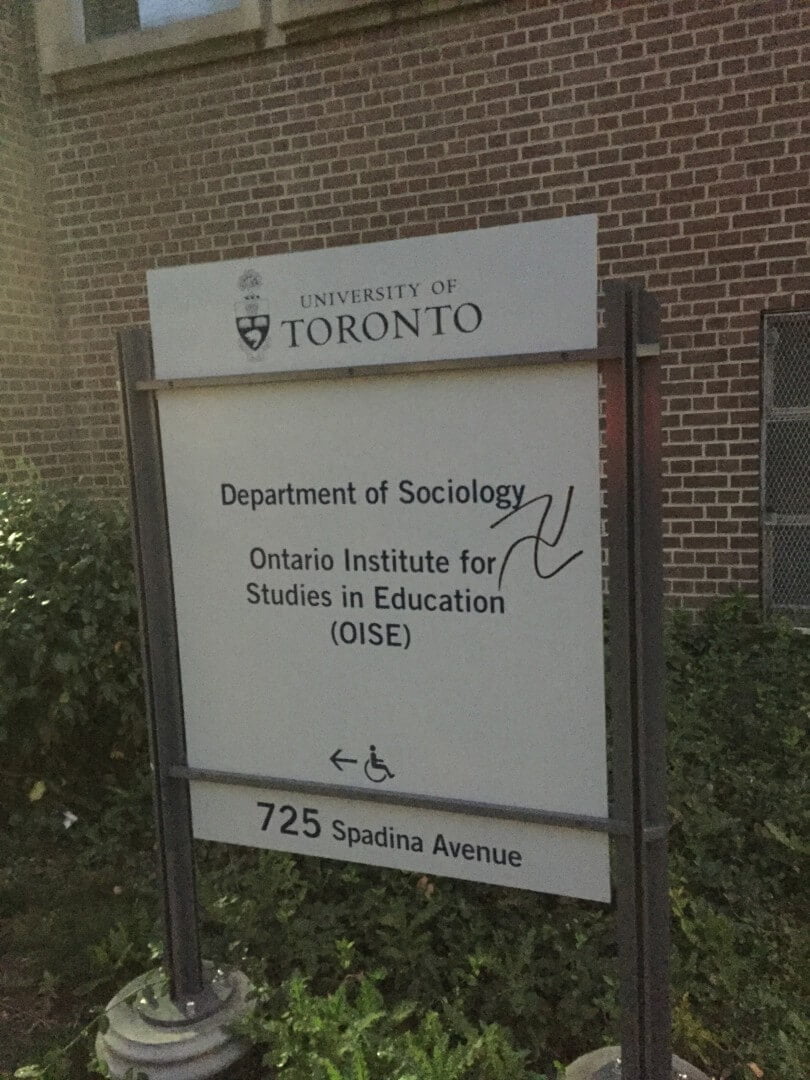
Dec. 12, 2022
TORONTO — B’nai Brith Canada is asking Ontario’s Ministry of Colleges and Universities to implement the International Holocaust Remembrance Alliance (IHRA) definition of antisemitism at the University of Toronto, following the release of a damning pre-published paper.
The paper was written by Dr. Ayelet Kuper, who served as U of T’s Senior Advisor on Antisemitism last year. It follows about a decade of concerns and investigations by B’nai Brith, which demonstrated U of T’s ongoing inaction and inability to address in a reasonable manner the rampant antisemitism at the university.
Dr. Kuper’s paper punctuates B’nai Brith’s previous findings of serious antisemitism at U of T.
The paper, pre-published in the Canadian Medical Education Journal, addresses numerous, chronic instances of antisemitism. Dr. Kuper reports on Jews being referred to as “liars” in multiple contexts. The incidents she addresses primarily occurred after Israel’s self-defensive measures against Hamas terrorism in 2021, but she also wrote that antisemitism has risen since at least 2016 at U of T.
Dr. Kuper also describes a campus culture that regularly uses a distorted definition of Zionism to justify antisemitic behaviour against Jewish students and faculty members. This includes demands from radical “advocates” – students and faculty members – that Jews disavow Israel, the world’s sole Jewish state.
Another incident Dr. Kuper cites in her paper is a group of faculty members objecting to a presentation on antisemitism that was given by Irwin Cotler, Canada’s Special Envoy on Preserving Holocaust Remembrance and Combatting Antisemitism. The letter sent by the faculty group after the presentation was “seen as blatantly antisemitic,” according to Dr. Kuper’s paper.
Dr. Kuper’s findings follow numerous anti-Jewish incidents on campus, dating back to a decade ago.
At a 2020 meeting with U of T senior leadership, including University President Meric Gertler, B’nai Brith presented the administration with a 30-page report entitled Confronting Antisemitism at the University of Toronto: A Path Forward, containing numerous recommendations on how to address antisemitism. They included adopting the IHRA definition of antisemitism. Another recommendation called for the university to enforce its own policies and procedures when confronted with antisemitic incidents.
The university subsequently announced the creation of an Antisemitism Working Group (AWG) as a result of this meeting. Months after the formation of the AWG, the group released a three-paragraph interim report that offered no concrete recommendations. After significant B’nai Brith advocacy, the AWG released its final report, which failed to present a viable pathway to combat antisemitism on campus, leading to widespread condemnation by B’nai Brith and other Jewish organizations. It was developed with a flawed consultation process and not only rejected the IHRA definition at U of T, but also disturbingly declared it inappropriate for any academic institution.
This, despite the fact that dozens of universities in the United States and elsewhere have successfully adopted the IHRA definition. In fact, U of T failed to define antisemitism at all. B’nai Brith issued a detailed response to the flawed AWG report entitled One Step Forward, Three Steps Back: Hatred, Apathy, and Antisemitism at the University of Toronto. U of T has never responded substantively to B’nai Brith’s detailed analysis.
“Had U of T adopted and implemented the IHRA definition, the university would have provided some hope to Jewish students and faculty facing ongoing antisemitism on campus that there was a brighter path forward,” said Michael Mostyn, Chief Executive Officer of B’nai Brith Canada. “Instead, Dr. Kuper’s documentation of the crisis at the U of T medical school confirms what B’nai Brith has been arguing for years – that U of T has a serious antisemitism problem.
“The Province of Ontario adopted the IHRA definition some time ago, and yet the University of Toronto remains comfortable with having absolutely no definition of antisemitism while its Jewish community members continue to face hostility on campus. This is an untenable situation. U of T requires an intervention by the provincial government.
“Given the lengthy history of U of T’s failure to meaningfully address its antisemitism crisis, the matter needs to be escalated to the Ministry of Colleges and Universities. We are in communication with the Ministry to demand implementation of the IHRA definition at the University of Toronto.”


